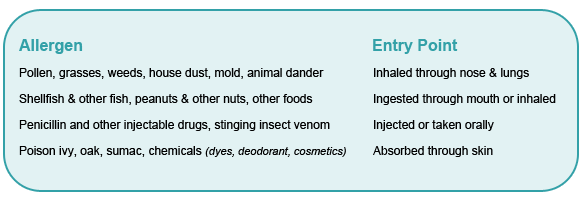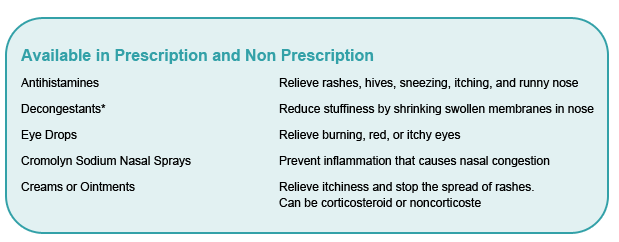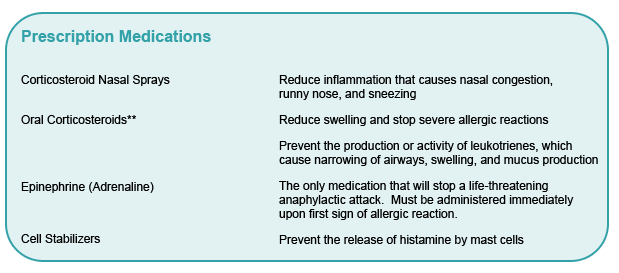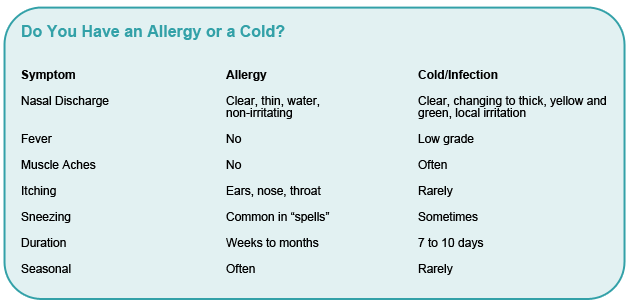Allergy Basics
What are Allergies?
Allergies are an overreaction of your body’s immune system to a harmless foreign substance that enters the body, like pollen or animal dander. Substances that cause this reaction are called allergens. The job of your immune system is to identify foreign substances in the body and get rid of them. An allergic reaction occurs when an allergen enters the body and your sensitive immune system overreacts to it by producing antibodies to fight of the allergen. These antibodies cause the release of histamines and other body chemicals that result in runny nose, itchy and watery eyes, sneezing, and swelling.
Anyone Can Get Allergies
Although people are not born with allergies, they often inherit the tendency to develop them. Allergies often begin in childhood, but can develop or re-emerge later in life.
How Allergens Enter Our Bodies
There are several types of allergens, and they enter our bodies in different ways.

Allergic Reactions
Just as there are different allergens, there are also different types of allergic reactions. Reactions to allergens range from runny nose, itchy eyes, and sneezing to hives and life-threatening anaphylaxis.
Allergic Rhinitis is an inflammation of the mucus membranes in the nose, throat, sinuses, and/or ear passages that occurs when you inhale an allergen. Symptoms include stuffy and itchy nose, sneezing, clear nasal discharge, and itchy ears and roof of the mouth. This reaction can be seasonal or year round.
Allergic Conjunctivitis is an eye allergy that causes red, itchy, watery eyes.
Allergic Asthma is an inflammation of the airways in the lungs. Inhaled allergens can trigger symptoms, including coughing, wheezing, shortness of breath, tightness in the chest, and/or excessive mucus.
Anaphylaxis is a generalized allergic reaction that may include hives, shortness of breath, drop in blood pressure, and life-threatening loss of consciousness.
Atopic Dermatitis (eczema) is a red, itchy, dry rash usually on the elbows, knees, and skin folds. It may be the result of an allergic reaction.
Urticaria, or hives, also appear on the skin, but take the form of itchy welts that appear all over the body.
Contact Dermatitis is an itchy rash that usually breaks out on the skin where an allergen has touch it (for example, poison ivy).
How Allergies are Diagnosed
• A physician makes a diagnosis of specific allergies based on multiple factors, including:
• Personal and medical history (including records of reactions)
• Physical examination, particularly of lungs and sinuses
• Tests to determine allergens
Allergy Testing
Skin Tests are the most accurate and least expensive method for detecting allergic antibodies.
Prick/Scratch Test involves placing a small drop of the allergen on the skin and then lightly pricking or scratching the skin with a needle.
Intradermal Test involves injecting a small amount of the allergen into the outer layer of skin.
In both of these tests you have an allergy if you have a local skin reaction within twenty minutes.
Blood Tests, including Immuno Cap or RAST tests, are used to confirm that your body is producing the antibodies that cause allergies. These tests are more expensive and are used for people who have a skin condition or are taking medication that interferes with skin testing. A sample of your blood is sent to the laboratory where the lab measures the amount of antibodies produced to fight the allergen.
Patch Tests are used to determine if you have contact dermatitis. A small amount of the allergen is placed on your skin and covered with a bandage. After 48 hours, the area is checked for a rash.
Special Food Allergy Tests
The Food Challenge Test involves first eliminating the suspected allergen from your diet and then administering suspected food allergens in slowly increasing amounts under careful medical supervision.
Elimination Diet requires that you eat a restricted diet of only certain foods. Gradually you add or reintroduce other foods. Together, you and your doctor determine which foods are allergens based on which you ate prior to a reaction.
Effective Allergy Treatment
Education — Learn about your condition and how to avoid your allergens.
Medication — Learn to use prescription and nonprescription medications to prevent and relieve allergic reactions.
Allergen Immunotherapy — For people with life-threatening allergies or respiratory allergies. Not effective for food allergies.
Education about Allergens
The best way to prevent allergy symptoms and reduce your need for medication is to avoid your allergens as much as possible. For important tips, talk with your doctor or call for other pamphlets about avoiding allergens in your environment.
Take the Right Medication
Talk with your doctor about which medications are best for your symptoms and your body. It is important to take the proper medicine for maximum results.

*Warning: Use for more than 3 consecutive days can result in “rebound” effect which increases swelling and stuffiness in nasal passages. Combined antihistamine/decongestants often contain ibuprofen or aspirin which can cause asthma episodes.

**Warning: The potential for side effects should be discussed with your doctor.
Allergy Shots
Allergy shots, or immunotherapy, are useful for people who cannot avoid their allergens or control their symptoms with medication. Injections of very small doses of your allergens are gradually increased over time until you build up a resistance to them. Immunotherapy is particularly useful for people with life-threatening reactions to stinging insects and those with respiratory allergies. Allergy shots are not effective in eliminating hives or allergies to food and feathers.
See a Doctor if…
You CANNOT AVOID your allergens, and prescription and nonprescription medicines are not working.
You are taking NONPRESCRIPTION allergy medicines for more than 3 MONTHS (total) in a year
You are having SIDE EFFECTS from nonprescription allergy medicines
Your symptoms are severe enough to DISRUPT school, work, or your LIFESTYLE




